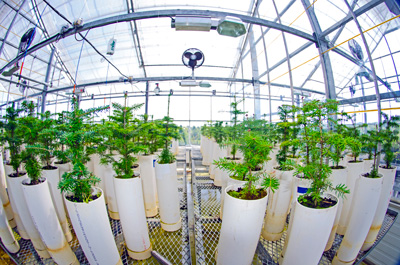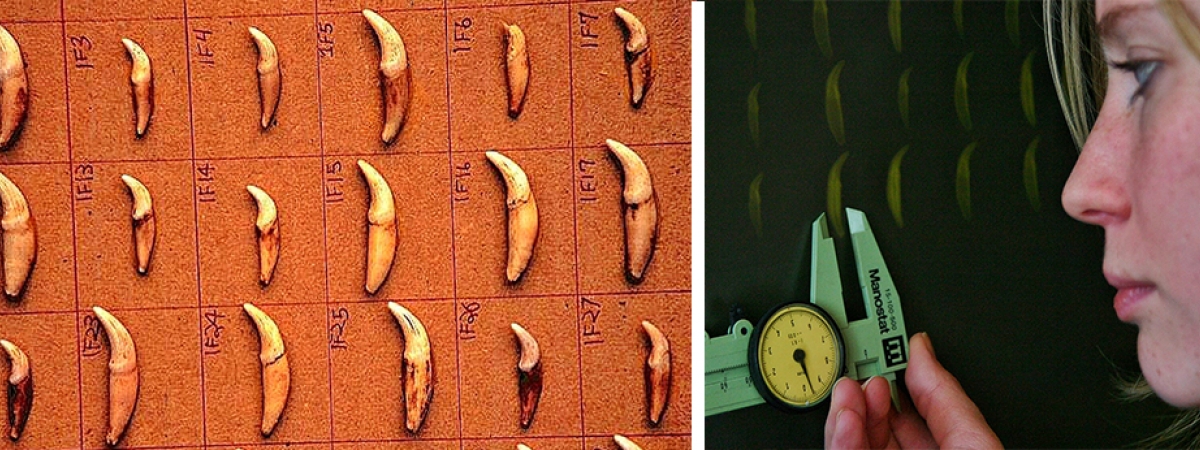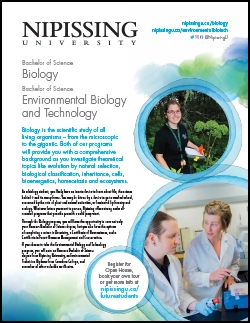








Welcome to Environmental Biology and Technology (ENBT) at Nipissing
Single Major
Our Environmental Biology and Technology (ENBT) program specializes in providing you with the knowledge and skills required to study Environmental Biology from many perspectives. You will receive the double-benefit of combining the academic education provided by Nipissing University with the practical and technical skills taught by our colleagues at Canadore College. All courses are completed within four years, and you will emerge with both a university degree and a college diploma. As well, there are a number of special certificates that ENBT students can earn.
Graduates of the Environmental Biology and Technology program receive a Bachelor of Science degree from Nipissing and an Environmental Technician - Protection and Compliance diploma from Canadore College.
Nipissing University Professors and Instructors are outlined under the “Our People” tab. Our colleagues from Canadore College who collaborate on the ENBT Program include professors with expertise in the areas of Chemistry, Geoscience, Microbiology and Biology.
Outdoor Classrooms
Students have easy access to a 290-hectare natural area on campus that includes forests, meadows, streams, a pond and an impressive waterfall. In addition, the campus is surrounded by dozens of lakes and many different types of forest habitats, in which classes, field trips, and research projects can take place. The Lake Talon Field Research Station hosts several kinds of Field Camps where Nipissing students can spend a week in a forest-and-lake situation learning and polishing their outdoor skills. Students of the ENBT Program have access to the lab and research facilities at Nipissing, as well as the facilities of Canadore College, since the ENBT Program involves the collaboration of the two institutions.
Bachelor of Science (BSc) in Environmental Biology and Technology
Environmental Biology and Technology at Nipissing University
Courses in Biology & Chemistry
BIOL 2346: Techniques in Forestry
This course will provide students with an overview of the approaches and techniques used to study and manage forest ecosystems. Topics will include orienteering, ecological land classification, forest mensuration, silvicultural tree marking, long-term monitoring of permanent plot networks, wildlife habitat and biodiversity indicators, and dendrochronology.
BIOL 3447: Silviculture
Examine practices used to control the establishment, growth, species composition, and health of forests to meet diverse needs and values while following ecosystem-based management approaches to reforestation. Topics include silvicultural systems, stand development, site productivity, tree growth/architecture, tree improvement, seeding and planting stock, natural and artificial regeneration; site preparation, and tending.
CHEM 2056: Physical Chemistry
Students acquire a basic understanding of chemical thermodynamics and kinetics. Topics in thermodynamics include ideal and non-ideal gases, the three laws, physical transformations of pure substances, simple mixtures, chemical equilibrium, and chemical kinetics.
CHEM 4206: Electrochemistry
The physical properties of charged electrode/solution interfaces and the chemical processes that occur as a result of changes in electrical energy at those interfaces. Topics include a review of electrode processes of electrochemical cells, redox reactions of inorganic and organic substances, electrochemical instrumentation, electric double-layer structure and adsorption, electrode reaction kinetics and potential sweep methods.
Certificates earned through Canadore College
The Entry Level Drinking Water Course (ELC) – is a step towards an Operator-in-Training/ Class 1 Drinking Water Certificate.
The Green Check GPS Certificate – signifies that the recipient has a high-level of knowledge about using the Global Positioning System for successful navigation.
The Ontario Benthic Biomonitoring Network Certificate – denotes competency at identifying benthic invertebrates from lakes and streams.
The Workplace Hazardous Materials Information System (WHMIS) Certificate – authenticates knowledge of how to work safely around dangerous chemicals.
Certificates available to all Nipissing students
Certificate in Applied Behaviour Analysis (ABA) - Lifespan
Certificate in Archaeological Monitoring
Business Fundamentals Certificate
Certificate in Conflict Resolution and Negotiation
Certificate in Early Intervention
Certificate in Environmental Management
Certificate in Forest Resource Management and Conservation
Certificate in Health Studies and Gerontology
Certificate in the Study of Societies in Transition
Certificate in the Study of State Violence (War, Atrocity, and Genocide)

Nipissing University Greenhouse Complex
The Nipissing Greenhouse Complex is a state-of-the-art greenhouse that features three large growth zones containing multiple moveable benches. Each zone features independent computer controlled temperature, humidity and lighting that can be custom programmed for each plant and growing condition. The state of the art Argus System uses dedicated control hardware and software for maximum safety and reliability.
Plant Growth Facility
The Plant Growth Facility is located on the roof of Nipissing University's H-Wing. This facility houses two Conviron PGR14 computer controlled growth chambers. These chambers are capable of being programmed to regulate humidity, temperature and light over a 24-hour period.
Animal Research Facility
Nipissing University has a state-of-the-art high security Animal Research Facility where animals can be humanely studied by means of research projects that have been scrutinized and approved by the Animal Care Committee. This group is, in turn, overseen by the Canadian Council on Animal Care.
Central Analytical Facility
The Central Analytical Facility was created through a Canadian Foundation for Innovation initiative which brought together various stakeholders including Nipissing University, the Governments of Canada and Ontario, Varian Canada, Perkin Elmer and Fisher Scientific.
Research Groups
Academic Support Services
Our goal is to support your academic and personal development. Look for assistance with accessibility services, learning style assessments, writing skills, writing formats, study strategies, time management, note-taking skills, academic resources, group seminars, peer support, career development activities, and more. Learn More...
Financial Support Services
Achieve your goals on time and on budget. We’ll help you fund your education through scholarships, awards, bursaries, government assistance, and work study programs. Learn More...
Scholarships, awards, and bursaries for students in Biology programs
Internationalize your Degree
If you want to experience a year or a semester at one of our partner schools across the globe, we have support services and programs to help you get there. If you want to assist International students with adjusting to life in Canada, we’ll connect you. Check out your options...
Personal Counselling Services
Our registered counsellors offer free, year-round personal counselling services, specialized therapeutic groups, referral services and a host of wellness, educational and awareness events to all full- and part-time undergraduate and graduate students. Learn More...
Residences
Our top-rated residences will make you feel right at home. You will make fast friends with your residence community. Our student leaders, Residence Dons, and award winning residence staff give tutorials on everything from the basics of laundry and cooking to making connections within the community. Learn More...
“I hear and I forget, I see and I remember, I do and I understand.” Confucius
Experiential learning is an effective medium that enhances and reinforces classroom learning. In addition, skills and competencies in the areas of communication, teamwork, analysis, work ethic, and problem solving are all learning outcomes that assist with finding the right career path for you.
Third and fourth year Arts and Science Students will be interested in our 3 credit course, UNIV 3006 Experiential Learning for Arts and Science Students. Within this course, academic assignments and at least 60 hours of placement in the community within a field that is related to your course of study is offered.
Experiential Learning Program for Arts & Science Students (ELAS)
The Experiential Learning for Arts & Science Program (ELAS) is an exclusive project between Student Development & Services, the North Bay & District Chamber of Commerce (NBDCC) and the Faculty of Arts & Science. This project focuses on providing students with hands-on learning experiences directly related to their academic interests.
With a strong emphasis on learning competencies, the ELAS immerses students with enriched learning opportunities that focus on the development of professional skills resulting in confident, successful and highly employable graduates ready for the workforce.
The ELAS program provides support for Arts & Science students to participate in activities such as:
- Conferences and speakers
- Site visits and field trips
- Work placements
When it comes to experiential learning at Nipissing University, you have lots of choices. Let us help you navigate your options, so you can find the best fit for your personal and professional goals, as well as your schedule.
Visit nipissingu.ca/academics/ELAS for more information.
Leadership and Community Engagement
If you are eager to get involved beyond the classroom, take part in the annual Undergraduate Research Conference, which gives you the opportunity to present your work to peers, professors, and family members. You may also have opportunity to work as a Research Assistant to help a professor conduct research and gain valuable experience at the same time.
Record of Student Development
Your experience at Nipissing University is more than just the time spent learning great things in lectures, labs, and seminars. It’s also about the activities you are involved in outside of the classroom, the causes you champion to make change on campus, the clubs you organize, the awards you receive, the workshops you participate in, the volunteering you do, and all the learning that occurs outside of the classroom.
The Record of Student Development (RSD) is Nipissing University's way of recognizing that learning is happening everywhere on campus. It is a formal record, otherwise known as a co-curricular transcript, where you can include workshops, volunteer experiences, awards, activities, and on campus employment experiences that you participate in throughout your degree.
Each RSD Approved activity in our database is linked to competency areas employers are looking for such as:
- Critical Thinking
- Leadership
- Digital Literacy
- Equity and Diversity
- Emotional and Interpersonal Intelligence
- & more!
To see the full list of competencies and get started building your Record of Student Development go to: rsd.nipissingu.ca
Nipissing University Student Union (NUSU)
Students attending Nipissing University in North Bay and long distance students are members of the Nipissing University Student Union. Our organization strives to represent students democratically, provide a communication framework, and lobby for legislative change on issues that affect students.
Athletics
Exercise and healthy competition always help to clear the mind.
INTRAMURAL SPORTS
Nipissing’s Athletics Department offers a wide range of intramural activities to keep you on your game
LAKERS CLUB SPORTS
Club sports are available to all Nipissing students and are both recreational and competitive.
VARSITY SPORTS
Go Lakers! Our varsity athletes always bring their “A” game. Get your friends together and come out to cheer on your favourite teams.
STUDENT ATHLETICS CENTRE
Whether you are a gym enthusiast or a weekend warrior, Nipissing has just what you need.
Full-time Faculty
- Extension4148Website—
- Extension4701Website
- Extension4527EmailWebsite
- Extension4420Website—
- Extension4430Website
- Extension4297Website—
- Extension4323EmailWebsite—
- Extension4425EmailWebsite—
- Extension4236Website—
- Extension4030EmailWebsite—
Adjunct Professor
- Extension—EmailWebsite—
Staff
- Extension4400Website—
- Extension—Website—

"My education at Nipissing has truly made me the student I am today. Nipissing offered individualized hands-on experiences to help each student find their individual niche and interest. I was given many opportunities at Nipissing to explore various fields of biology to help me identify my own skills that I can contribute to the field of biology. Following my degree, I completed a Masters of Science in Biology at York University. The critical thinking skills that were developed at Nipissing were crucial to my success in this very independent program. Currently, I am enrolled in the Masters of Occupational Therapy program at the University of Toronto learning new ways that my degree can be applied.
The base that Nipissing has provided me is unique; it was an amazingly supportive environment that still supports me to this day. I owe my love of biology to my professors at Nipissing University, their contagious passion, and their never-ending support for learning."
Diane Brownlee, BSc (Hon.) ‘13, MSc ‘15, MSc OT '17
"My classroom studies really supported my interests outside of school and definitely fuelled my involvement in the development of the student-led Ecovillage [residence townhouses devoted to reducing energy consumption] and the launch of the Flip-a-cup program [reusable mugs regularly washed by the cafeteria]. I really believe that even small changes can decrease our impact and ecological footprint. Whether promoting campus sustainability or assisting consumers in making environmentally friendly choices, all have a significant impact on the environment."
Melissa Lacey, BSc '08
"My undergraduate experience at Nipissing helped prepare me to pursue graduate research studies. The teaching-intensive Biology program provided me with a strong understanding of the field, and I had several opportunities to engage in research projects, which enhanced my ability to think both critically and scientifically. Having these experiences and a firm understanding of Biological principles, I was able to engage in PhD studies in New Zealand right out of Nipissing's degree program. Now three years into it, I am nearing completion of a PhD in Pathology at the University of Otago, New Zealand's leading University in research. I am being trained in the field of Free Radical Biology among some of the field's leading experts, in a lab that is internationally renowned and respected in the field. Nipissing University provided me with a strong platform to succeed and fulfill my dreams of becoming a research scientist."
Melissa Stacey; BSc (Hon.) '06 (Nipissing); PhD Candidate in the department of Pathology, University of Otago, Christchurch, NZ.
Graduates have gone on to successful careers in medicine, consulting, wildlife management, public health, and forestry. Our students have won prestigious scholarships, published thesis work in international scientific journals, and accepted awards at international conferences. Our students also have a high success rate in applying for postgraduate studies and receiving highly competitive scholarships.
Environmental Science / Environmental Studies
Career and Academic Options
- Graduate Studies (Master and Doctoral degrees in the fields of biology and health)
- Professional School (Medicine, Education, Law, MBA, Physiotherapy, Dentistry, Optometry, etc.)
- Careers in biology, research, wildlife management, environmental management, forestry and consulting












